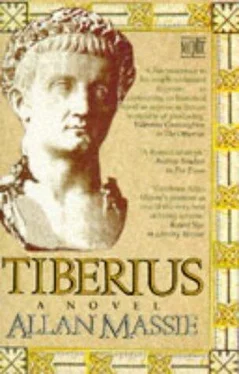Allan Massie - Tiberius
Здесь есть возможность читать онлайн «Allan Massie - Tiberius» весь текст электронной книги совершенно бесплатно (целиком полную версию без сокращений). В некоторых случаях можно слушать аудио, скачать через торрент в формате fb2 и присутствует краткое содержание. Жанр: Исторические приключения, на английском языке. Описание произведения, (предисловие) а так же отзывы посетителей доступны на портале библиотеки ЛибКат.
- Название:Tiberius
- Автор:
- Жанр:
- Год:неизвестен
- ISBN:нет данных
- Рейтинг книги:5 / 5. Голосов: 1
-
Избранное:Добавить в избранное
- Отзывы:
-
Ваша оценка:
- 100
- 1
- 2
- 3
- 4
- 5
Tiberius: краткое содержание, описание и аннотация
Предлагаем к чтению аннотацию, описание, краткое содержание или предисловие (зависит от того, что написал сам автор книги «Tiberius»). Если вы не нашли необходимую информацию о книге — напишите в комментариях, мы постараемся отыскать её.
Tiberius — читать онлайн бесплатно полную книгу (весь текст) целиком
Ниже представлен текст книги, разбитый по страницам. Система сохранения места последней прочитанной страницы, позволяет с удобством читать онлайн бесплатно книгу «Tiberius», без необходимости каждый раз заново искать на чём Вы остановились. Поставьте закладку, и сможете в любой момент перейти на страницу, на которой закончили чтение.
Интервал:
Закладка:
Augustus was right. Yet I have often wondered whether I would not myself have been among the self-styled Liberators. I am sure at some moments that I would have been, for I would have found the rule of a single person — a rule then in its infancy — as repugnant as… as I find it now when I am myself that person. And yet, if I have any consistent virtue, clarity of mind must be granted me. Would I not then have looked around the Senate as I do now and have found a generation fit for slavery, no longer capable of exercising the restraint of the passions on which the enjoyment of true liberty depends?
It is not only a question of morality, though ultimately all political questions must be seen as that. It is a question of consistent authority. Rome has been destroyed by its empire; the doom of the Republic was written in the conquest of Greece, Asia, Africa, Gaul and Spain. My whole life, animated by Republican sentiments, has yet been devoted to making the re-establishment of the Republic impossible. And it is thanks to Brutus and his friends that the inevitable principate had its origins in murder and civil war.
These thoughts have been with me a long time. I looked around and saw no man but Sejanus capable of governing the empire. Drusus was a scoundrel. I doubted the mental balance of his younger brother, Gaius Caligula. My own grandson Tiberius Gemellus was a sweet child, but nothing in his nature promised that he would be a man of chara cter. Perhaps the best security for him was indeed that Sejanus should marry his mother and be entrusted with his care, as Augustus had entrusted me with the rearing of Gaius and Lucius. Surely, I thought, I could trust Sejanus? The nobility, jealous of his comparatively humble birth, would rebel if he was openly elevated to the position which Augustus had enjoyed, and I had endured; but he could be the power, as it were, behind the throne, my grandson's throne. I announced that as he had long been the partner of my labours, I would honour him by making him my partner in the consulship for the following year.
That announcement proved to Drusus that he had gained nothing by his betrayal of his mother and brother. He collected about him a group of giddy-minded, dissipated and discontented nobles. Their dinner-table talk was rank sedition. This was reported to me; I relayed it to the Senate, who ordered Drusus' arrest. Pending full investigation, he was held under house arrest. I ordered that he be strictly guarded, and forbidden company.
Agrippina, hearing the news, embarked on a hunger strike. Orders were given that she be forcibly fed. She resisted the attempt. Struggling with her guards, she received a blow which cost her the sight of her left eye.
9
Does chance govern all? I had a letter from Antonia, my brother's widow, Germanicus' mother, saying she hoped to visit me, perhaps for a few days while she was holidaying at her villa on the Bay of Naples. I was minded to refuse, though I have always liked and admired Antonia. I was afraid that she would plead for her grandsons Nero and Drusus; not for her daughter-in-law Agrippina, I was sure of that, for she had never cared for her. It would have been embarrassing to endure her intercession on their behalf. So I wrote a letter saying I was unwell and unable to receive visitors.
But I did not send it. I was distracted by another letter I had received. This was from Sejanus. He requested that I accord him the tribunician power, that Republican status which Augustus had employed as a device to enable him to initiate and veto legislation and to ensure that his person was sacrosanct, which I had, of course, been granted by him. In fact I had been considering whether this should not be accorded Sejanus; I had hesitated because I knew how much a grant would stimulate discontent and envy. Yet the matter was on my mind. Now, on the other hand, there was something in the tone of Sejanus' letter which was displeasing, a peremptory note, as if he had only to ask to be given what he demanded. There was an underlying suggestion that with this power he would be free of my authority. It was not stated. Perhaps Sejanus himself did not know that it was there, but I caught a whiff of arrogance and impatience and this disquieted me.
In my perturbation, nostalgia invaded me. When I thought of Antonia, I set aside my fears as to what she would request. I was able to forget the sink of political Rome, with its private bureaux of espionage, its stench of conspiracy, its atmosphere infected by suspicion and fear; instead the memory came to me of conversations under chestnut trees, conversations that stretched towards the setting sun, and covered in the most friendly and sincere manner the whole range of human experience. In talking with Antonia, I reflected, I would share again some species of communion with my long-dead brother. And I remembered that in those distant days Antonia and I had been bound together by the purest sort of affection, that between a man and a woman, into which is breathed only the lightest breeze of sexual desire — a desire which, for imperative reasons, will never be translated into action; an affection which floats like a raft on a lake in the sunshine of a summer afternoon that can never end.
There was to be a happy day before she arrived. Sigmund had fallen in love with a local girl, a Greek called Euphrosyne, whose father practised as a doctor in Naples, but owned a little villa on Capri, given to him by Augustus in return for some service he had rendered. It would have been a quite unsuitable marriage but for my patronage. Miltiades (the father) would never have consented that his adored daughter should marry anyone so unsuitable as a German freedman, who had, moreover, been a gladiator, if that freedman had not also been my favourite. For my part I was delighted by the match. Euphrosyne was an enchanting girl, with black eyes and a mass of dark curls, a creature made for pleasure, yet tender-hearted and witty. To see them together was a justification of empire, for what but Rome could have brought these two perfect, but contrasting, physical types together? Their happiness and the delight they took in each other enfolded us all. I blessed the marriage, asking only that both remained in my household.
Antonia arrived early, while we were still celebrating. Her hair was white but she retained that serene beauty which she had inherited from her mother, Octavia.
"You must forgive me," she said, "I never keep to my plans exactly, for reasons I shall later explain. Meanwhile, Tiberius, how delightful it is to see you again, looking so well and happy."
"You have come in the middle of a happy occasion," I said, "and your arrival, Antonia, adds to the pleasure."
"Ah," she said, "if Rome could see you now, so innocently engaged as a sort of godfather, people would be ashamed of the scurrilous stories they are so fond of retailing."
"You risk spoiling my pleasure by mentioning that place."
"That's the last thing I want to do," she replied, but her face clouded.
"It's strange," she said, "how we have remained friends."
"We have our dear Drusus and many memories in common."
"And yet I cannot turn anywhere without being told that you are the enemy of my family."
"We could never be enemies, Antonia. I remember with the greatest gratitude how you refused to heed the vile rumours about Germanicus' death."
"I knew they were all lies. I knew you could never have a hand in the death of your brother's son. Now two of his grandsons have been imprisoned by your command."
"By order of the Senate."
"At your request…"
"If you had seen the evidence…"
She looked away, her grey eyes filled with tears. A little wind blew whispers of the ocean towards us. The blue-veined marble of the terrace shone like a dull shield in the noon sun. We sat in the shade under an arbour of trailing roses.
Читать дальшеИнтервал:
Закладка:
Похожие книги на «Tiberius»
Представляем Вашему вниманию похожие книги на «Tiberius» списком для выбора. Мы отобрали схожую по названию и смыслу литературу в надежде предоставить читателям больше вариантов отыскать новые, интересные, ещё непрочитанные произведения.
Обсуждение, отзывы о книге «Tiberius» и просто собственные мнения читателей. Оставьте ваши комментарии, напишите, что Вы думаете о произведении, его смысле или главных героях. Укажите что конкретно понравилось, а что нет, и почему Вы так считаете.












